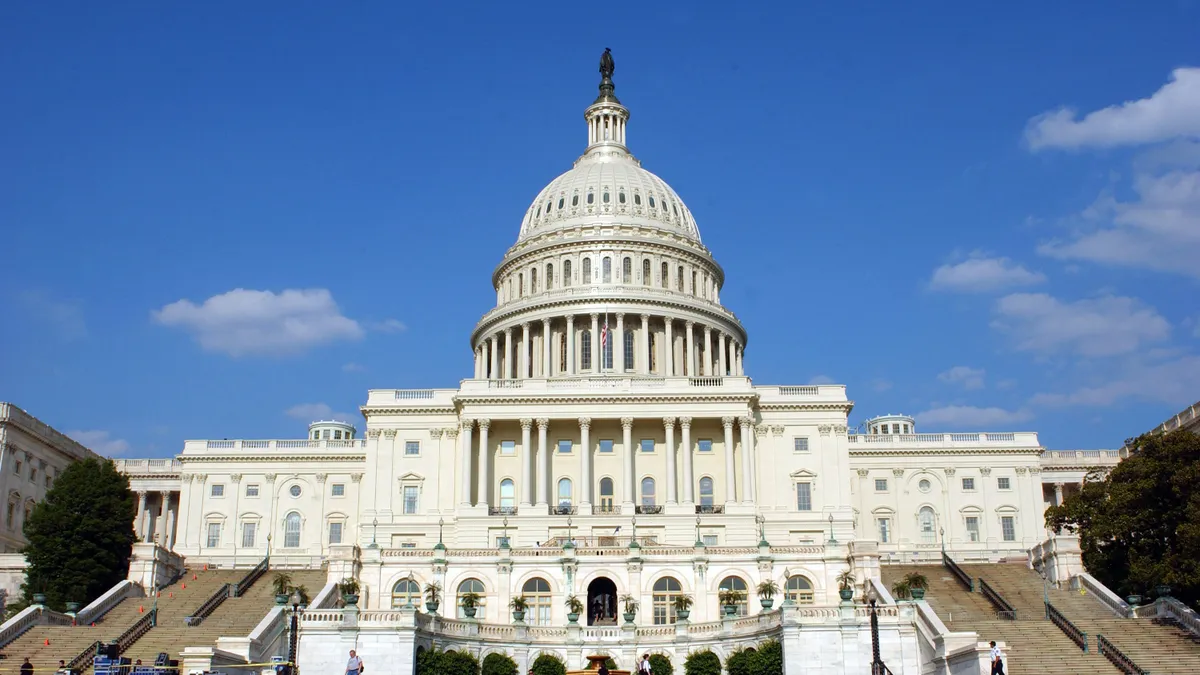UPDATE: Dec. 10, 2021: The Senate late Thursday voted for passage of an end-of-year package that seeks to delay 2022 Medicare rate cuts of 15% for nearly 600 clinical laboratory tests slated to kick in next month.
The bill, passed by the House of Representatives late Tuesday, must now be signed by President Joe Biden to become law.
The American Clinical Laboratory Association, which represents Labcorp and Quest Diagnostics, in a statement applauded the passage of the Protecting Medicare and American Farmers from Sequester Cuts Act that provides a one-year delay to cuts for many of the most commonly ordered lab tests used to diagnose chronic diseases such as heart disease, diabetes and cancer.
"America's 56 million seniors can breathe a sigh of relief," Tom Sparkman, ACLA's senior vice president of government affairs and policy, said in a Thursday statement. "The pandemic has had a profound impact on seniors and has made it ever more challenging for many to receive the routine care and treatment they rely on to stay healthy."
ACLA has been fighting for years against the "flawed" implementation of the Protecting Access to Medicare Act (PAMA) of 2014, which sets laboratory payment rates according to market data reported by industry.
CMS contends that the rate cuts better reflect market pricing data, saying on its website that beginning in January 2018, payments for "most tests equals the weighted median of private payor rates."
William Blair analysts in a Friday note said "the delay in the next round of PAMA cuts (cuts were also postponed in 2021) will benefit the reference lab names on our list (Quest and Labcorp)."
Labcorp CEO Adam Schechter in an April earnings call estimated the 2022 impact from the Medicare cuts to "be about the same as it was in 2019, around the $100 million mark."
Labcorp's stock price was up nearly 3.5% Friday morning, while Quest's shares were up slightly.
Dive Brief:
- The U.S. House of Representatives late Tuesday passed a year-end legislative package that includes a one-year delay to Medicare cuts for clinical laboratory tests slated to go into effect Jan. 1. The bill must still secure Senate passage and be signed by President Joe Biden to become a law.
- House passage of the Protecting Medicare and American Farmers from Sequester Cuts Act comes a week after a coalition of 28 health organizations, led by the American Clinical Laboratory Association, sent a letter to congressional leaders warning that nearly 600 tests are scheduled to see up to 15% cuts beginning January that would negatively impact the health and wellbeing of more than 56 million seniors.
- In a Tuesday statement, the ACLA, whose members include Labcorp and Quest Diagnostics, applauded the legislation's inclusion of "relief from yet another year of cuts to many of the most commonly ordered clinical laboratory tests" due to the "flawed" implementation of the Protecting Access to Medicare Act of 2014.
Dive Insight:
ACLA, AdvaMedDx, the American Hospital Association and other health groups urged lawmakers to extend the one-year delay to the impending 2022 cuts to the Medicare Clinical Laboratory Fee Schedule, which they warned would reduce rates by 15% for certain tests used to diagnose chronic diseases such as heart disease, diabetes and cancer, among other conditions.
Tom Sparkman, ACLA's senior vice president of government affairs and policy, said in a written statement that the year-end Medicare package was "welcome news for seniors across the country" to ensure they "have access to the critical testing they need to make informed health decisions."
ACLA, AHA and other groups made their case in last week's letter to congressional leaders that "cuts will continue to damage the nation’s laboratory infrastructure at a time when it is needed most" during the second year of the COVID-19 pandemic. Rick Pollack, AHA's president and CEO, said in a written statement on Tuesday that the group appreciates the "delay of the harmful cuts to clinical laboratories."
CMS contends that the rate cuts better reflect market pricing data, saying on its website that beginning in January 2018, payments for "most tests equals the weighted median of private payor rates."
Congress has twice over the past two years come to the rescue, passing the Laboratory Access for Beneficiaries Act in 2019 and the Coronavirus Aid, Relief, and Economic Security Act in 2020.
In addition to a one-year delay for cuts to Medicare's Clinical Lab Fee Schedule (CLFS), the bill passed by the House on Tuesday includes a one-year delay to the private payer data reporting period that is slated to take effect next month.
The PAMA requirement to report private payer data applies to many hospitals with outreach laboratories, which would be required to report their private payer laboratory prices and volumes. Hospitals that received at least $12,500 in Medicare revenues from CLFS services, billed on the CMS 1450 14X bill type from Jan. 1 through June 30, 2019, are required to report on these data between January and March of 2022.
ACLA, AHA and others called for delaying both the scheduled 2022 Medicare cuts to laboratory services as well as the "burdensome" private payer data reporting requirements that kick in early next year.
Cowen analysts in a Tuesday note said the legislative package will prevent several Medicare provider pay cuts from going into effect Jan. 1, including "payment relief for clinical labs, hospitals, physicians, and a delay of the radiation oncology bundle."












